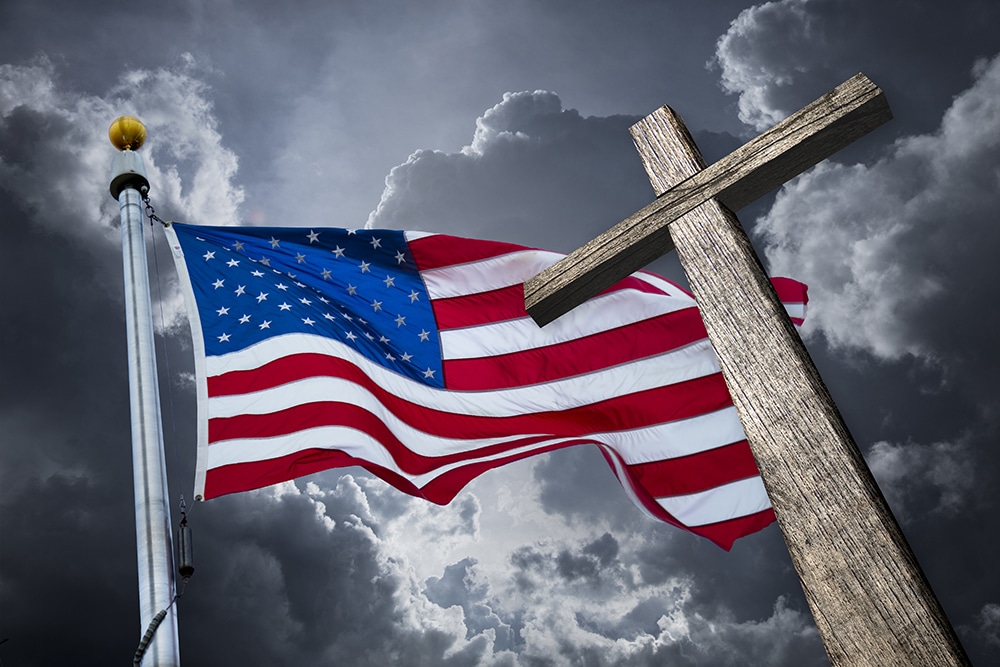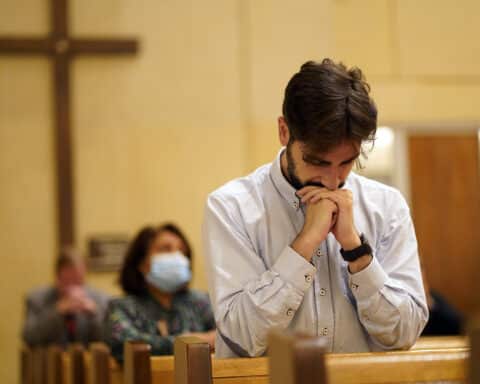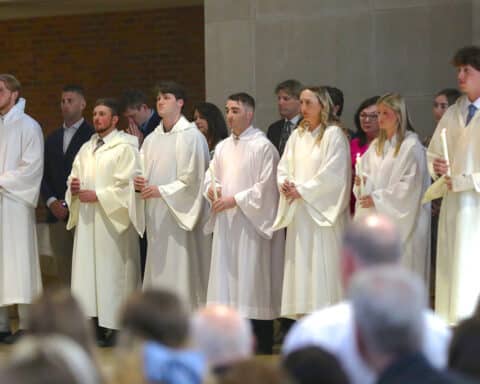Having just completed the most bitterly divisive presidential election in our lifetimes, it is useful to think about the abiding problem of partisan identification, especially among Catholics. The fissures that the election exposed are still with us. While the tension between Christians and political life is as old as Christianity itself, in the contemporary American Catholic experience, the problem is often distilled to partisan identification and allegiance. The general theologico-political problem has largely become the theologico-partisan problem.
The second-century apologetic letter Epistle to Diognetus suggests guidance on the relationship of Christian faith and practice to political identity and allegiance that is relevant for our highly politicized — and partisan — times. And it helps us to think more carefully about how partisan identification may lead to the corrosion of authentic Christian witness.
The Epistle highlights what might be called the “portability” of Christian faith among a variety of social or political arrangements. “Christians are indistinguishable from other men either by nationality, language or customs. They do not inhabit separate cities of their own, or speak a strange dialect,” the author explains. “With regard to … manner of life in general, they follow the customs of whatever city they happen to be living in, whether it is Greek or foreign.” Because Christianity is not defined in terms of any particular social, demographic, linguistic or political community, Christian faith and practice are not conditioned by such contingencies.
The obverse is that Christianity cannot be identified with any of these contingencies. Its independence from them necessarily implies its resistance to be reduced to them. The portability of Christian faith entails resistance to identification with particular regimes, or the philosophies, narratives and intellectual justifications of any of them. Thus the Epistle observes that Christians are “obedient to the laws, they yet live on a level that transcends the law” (my emphasis).
This observation reflects a model for Christian citizenship that has largely been lost in American political culture. It implies that Christians should obey the law and engage in broader civic life. But the justification for this participation is found in Christian moral thought, rather than the terms of the regime. We obey the laws of the state, but we explain that obedience by Christian principles of civic friendship that transcend the laws. And those principles should not be reduced to political life nor identified with a political party.
Thus the conscientious Christian necessarily lives in tension with any regime. She obeys its laws, but she resists underwriting the laws in the terms of her own Christian faith. Because the regime will only be justified in its own terms and by its own stories, to underwrite them is to risk compromising or accommodating theology to politics. Thus for the Christian to participate in that justification necessarily causes the Christian to change the terms of her own story to fit those of the party. We saw this accommodation on both sides in the recent election.
The Catechism of the Catholic Church defines the duties of citizens not primarily in political terms, but rather in broader terms of civic friendship, based upon the uniquely Christian understanding of the human person and his place in, and relationship to, broader civic culture. “It is the duty of citizens to contribute along with the civil authorities to the good of society in a spirit of truth, justice, solidarity, and freedom,” the Catechism explains (No. 2239). This duty is both more expansive than mere political engagement and delimiting of the importance of politics in civic life. The good of society includes the full scope of social relationships, of which political participation is but one of many. Politics should not be the sole, or perhaps even the primary, way that we fulfill our duty to contribute to civic life. Reducing civic friendship to political activity — or even worse, partisan loyalty — tends to erode the former as we are forced to pick sides. Thus we descend from civic friendship to political identification to party loyalty, with our theological commitments eroding from principles that transcend political parties to ideologies that underwrite them.
This problem was raised by John Courtney Murray, SJ, in his 1960 book “We Hold These Truths.” “The question is sometimes raised, whether Catholicism is compatible with American democracy,” he observes. “The question is invalid as well as impertinent; for the manner of its position inverts the order of values,” he continues. “It must, of course, be turned round to read, whether American democracy is compatible with Catholicism.” And, cutting to the point, he asserts, “The Catholic may not, as others do, merge his religious and his patriotic faith, or submerge one in the other.”
How much stronger is this admonition if religious faith is submerged into partisan “faith”? The result is that one does not merely justify partisanship by Christian faith, but descends further to justify theological positions by partisan identity. Inverting the order of values, we start by using theology to underwrite politics and end up using partisanship to underwrite theology. This verges on idolatry, as we compromise the integrity of the theological commitments that (no longer) transcend partisan loyalty.
This is not to suggest that we withdraw from political life. To resist partisan identification is not to abdicate our civic responsibility. But we should be more cautious about the tendency, first, to reduce the mandate for civic friendship to one for political activity and, second, to reduce political activity to partisan loyalty.
And we should reaffirm the principle of subsidiarity in the way that we think about civic life and political action. Political identity and partisan loyalty should be far removed from the many aspects of civil life that are more consistent with a commitment to subsidiarity. If we Christians were to live our civic lives as though politics mattered less, we are more likely to resist the siren call of the kind of partisan zealotry that defeats civic friendship.
Of course, this may leave Catholics in the partisan wilderness. But perhaps this is part of the cost of faithful Christian discipleship. While both major parties assert that they are committed to abstract moral terms like “dignity,” as an example, neither party can be taken seriously in those claims. And it is not our role as Catholic Christians to try to save them from themselves. As Christian theologian Stanley Hauerwas has said, “The church does not exist to provide an ethos for democracy or any other form of social organization, but stands as a political alternative to every nation, witnessing to the kind of social life possible for those that have been formed by the story of Christ.” When we try to provide such an ethos — when we do not simply “obey the laws” but feel compelled to justify them in their own terms — the transcendent foundation of our civic friendship is forgotten and our witness to the story of Christ is compromised.
Perhaps the tension suggested in the Epistle to Diognetus is not a problem to be resolved but rather a path to faithful discipleship and then, incidentally, to civic friendship. As Hauerwas and fellow theologian Michael Baxter have suggested, “Christians are called first and foremost not to resolve the tension between church and state, but to acknowledge the kingship of Christ in their lives, which means leaving church-state relations profoundly unresolved.” The bitter, rancorous partisanship of the 2020 election illustrates the urgency of this admonition.
Kenneth Craycraft is the James J. Gardner Family Chair in Moral Theology at Mount St. Mary’s Seminary and School of Theology, in Cincinnati, Ohio.





